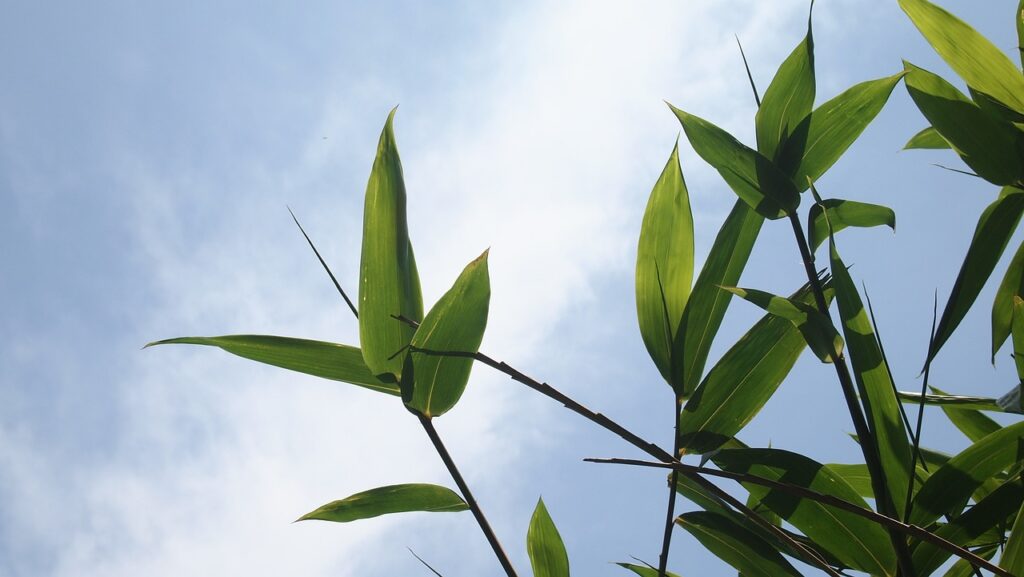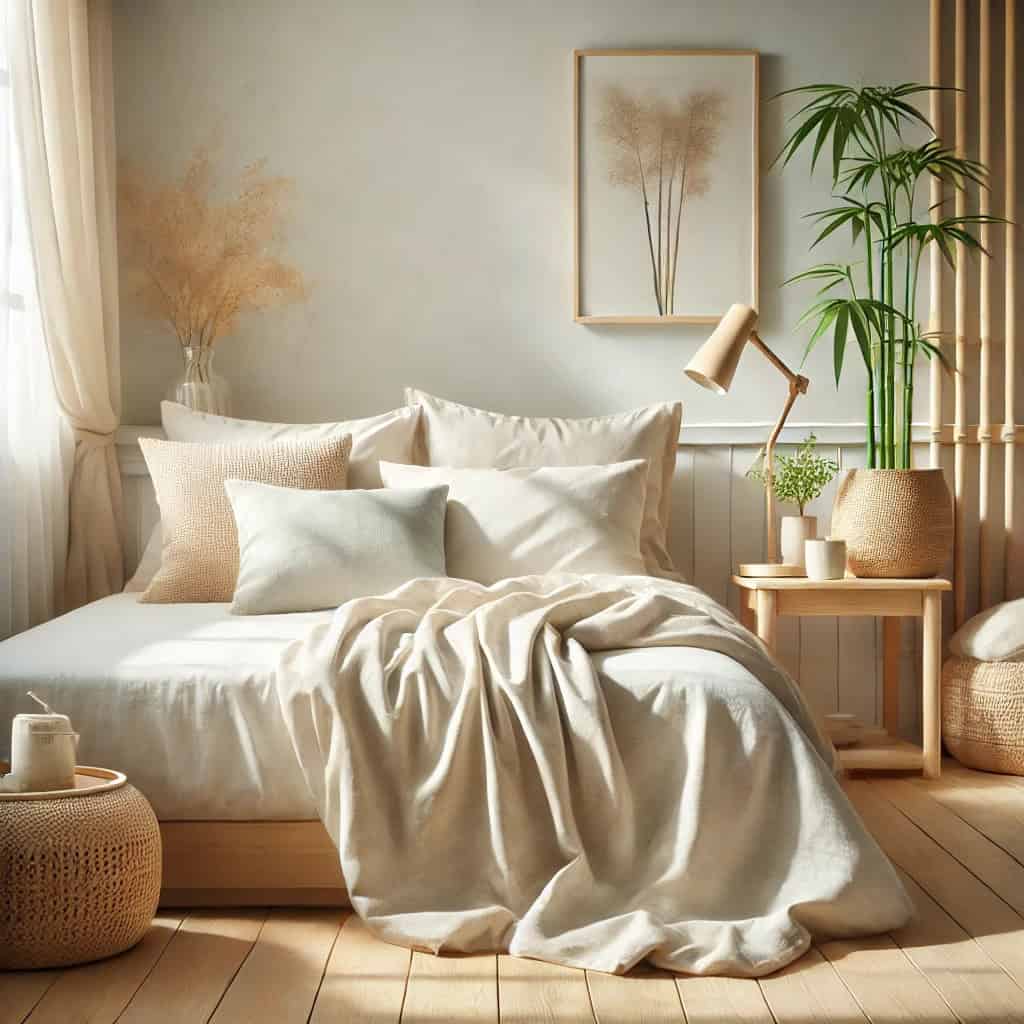Waking up with itchy skin or constant irritation isn’t just frustrating—it could have a lot to do with what you’re sleeping on, but I’m not sure many people realize that. Some fabrics hold on to dust and feel rough against your skin, making things even worse.
That’s where bamboo bedding really shines. It’s not just soft—it’s gentle on your skin, breathable, and made without the harsh stuff that tends to irritate sensitive skin.
Bamboo bedding can vary a lot in quality, so it’s worth checking the details before you buy. Always check for trusted brands and certifications to be sure you’re getting the real skin-friendly benefits.
Let’s look at why bamboo sheets might be the upgrade your skin has been waiting for.
What This Page Covers
What Makes Bamboo Bedding Skin-Friendly?
It’s not just the soft feel that makes bamboo bedding worth trying. It’s how it helps your skin feel calmer and more comfortable while you sleep.
- Hypoallergenic and Antimicrobial by Nature
Bamboo naturally contains something called bamboo kun, a compound that helps the plant resist bacteria and fungi while it grows. What’s really interesting is that some of these benefits remain after it’s turned into fabric.
According to research published in the Journal of Textile and Apparel Technology and Management, bamboo fabrics can reduce bacterial presence by up to 70%, even after multiple washes. This is a big win if you deal with acne, eczema, or irritated skin. - Dermatologist Tip
Bamboo bedding isn’t just popular with shoppers—it’s also recommended by experts. According to the National Eczema Society, bamboo is a soft, breathable option that helps manage eczema triggers like heat and friction. Medical News Today also lists bamboo as one of the best fabrics for eczema-prone skin, thanks to its moisture-wicking and hypoallergenic qualities. Communities like MyEczemaTeam recommend bamboo bedding for its smooth texture and natural resistance to bacteria and allergens. Many dermatologists recommend smooth, hypoallergenic fabrics like bamboo for people with eczema, rosacea, or other sensitive skin conditions. - Smooth, Gentle Texture
The fibers in bamboo sheets are naturally round and smooth. That means less friction on your skin while you sleep. If you have eczema, rosacea, or psoriasis, this can make a real difference in how your skin feels in the morning. - Breathable and Moisture-Wicking
Bamboo fabric helps regulate your temperature. It pulls moisture away from your body, keeping you cool and dry—even if you tend to get sweaty at night. This helps prevent the kind of damp, warm environment that bacteria love. - Kind to Allergy-Prone Skin
Bamboo sheets resist dust mites, mold, and common allergens better than many other fabrics. This makes them a smart choice if you often wake up with sneezing, itchy eyes, or irritated skin.
How Does Bamboo Compare to Other Fabrics?
Shopping for new sheets? It can feel like you’re drowning in choices, right? Here’s how bamboo compares to the rest:
| Fabric | ✅ Skin Benefits | ⚠️ Downsides |
|---|---|---|
| Bamboo | Hypoallergenic, smooth texture, moisture-wicking | Wrinkles easily, may shrink slightly after first wash |
| Cotton | Breathable, soft when high quality | Can feel rough, traps dust mites |
| Silk | Very smooth and gentle | Expensive, less breathable |
| Polyester | Budget-friendly, wrinkle-resistant | Traps heat and moisture, can irritate sensitive skin |
| Eucalyptus | Hypoallergenic, breathable, moisture-wicking | Slightly less soft than bamboo, price can vary |
Why Bamboo Bedding Is Also Good for the Planet
Choosing bamboo bedding isn’t just good for your skin—it’s a smarter choice for the environment, too. Bamboo grows fast, uses less water than cotton, and doesn’t need pesticides to thrive. That means fewer chemicals and less strain on natural resources.
Here’s what makes bamboo a more eco-friendly option:
- Grows Quickly Without Chemicals
Bamboo grows back fast after harvesting—some types can grow several feet in just a day—and it doesn’t need pesticides or fertilizers to stay healthy. - Uses Less Water Than Cotton
Bamboo needs far less water to grow, which makes it a better choice in places where water is limited. - Helps Clean the Air
Bamboo absorbs a lot of carbon dioxide and releases oxygen, which helps fight climate change. - Biodegradable
Bamboo fabric breaks down more easily than synthetic materials, which means less waste in landfills.
So when you pick bamboo bedding, you’re not just doing your skin a favor—you’re doing the planet a favor, too. Small choices like this really add up.

Who Should Consider Bamboo Bedding?
Bamboo bedding isn’t just for people with allergies—it’s a smart choice for anyone who wants their skin to feel calmer and more comfortable at night..
- People with eczema, psoriasis, or rosacea
- Acne-prone skin or those sensitive to bacteria
- Hot sleepers or anyone dealing with night sweats
- Allergy sufferers (dust mites, mold, pet dander)
- Anyone tired of waking up itchy or uncomfortable
Are There Any Downsides?
Of course, nothing’s perfect—bamboo sheets have their quirks too. Here’s what to watch out for:
Uncertified bamboo products might be treated with chemicals, so check for OEKO-TEX or GOTS certification when you can.
- It tends to wrinkle more than cotton.
- Some bamboo sheets shrink a little after the first wash.
- Low-quality blends may feel rough or lose their softness quickly.
Who Might Want to Skip Bamboo Sheets?
If you like your sheets crisp and wrinkle-free, or you’re shopping on a tight budget, bamboo might not be the best fit for you. High-quality bamboo sheets feel amazing, but they can cost more than basic cotton or synthetic blends.
Not All Bamboo Is the Same
Bamboo sheets come in different types, often referred to as bamboo fabric types, like viscose, lyocell, and bamboo blends. Lyocell is considered the best because it’s made using a cleaner process that keeps more of bamboo’s natural benefits. Blends with cotton or polyester can lose those skin-friendly perks, so check the label before you buy.
What do OEKO-TEX and GOTS mean?
Look for OEKO-TEX or GOTS certifications. These labels mean the sheets are tested for harmful chemicals, making them safer for sensitive skin.
- OEKO-TEX Standard 100 means the fabric has been independently tested and certified to be free from harmful levels of more than 100 substances known to be dangerous to human health.
- GOTS (Global Organic Textile Standard) ensures the bedding is made from organically grown fibers and processed in a way that’s safer for both you and the environment.
Quick Pros & Cons
| ✅ Pros | ⚠️ Cons |
|---|---|
| Naturally hypoallergenic and antimicrobial | Can wrinkle more than cotton |
| Smooth, gentle texture for sensitive skin | May shrink slightly after first wash |
| Breathable and moisture-wicking | Low-quality blends can feel rough |
| Temperature-regulating | Some bamboo sheets use more chemicals |
| Eco-friendly and sustainable | Higher-quality options can be pricier |
The Versatility of the Bamboo Plant!
Did you know how much can be made from this amazing plant? This video didn’t even cover all of it.
See here how many species it has!
How to Care for Bamboo Bedding (Especially for Sensitive Skin)
To get the most out of your bamboo sheets—and keep them skin-friendly—follow these simple care tips:
- Wash before first use to remove any factory residues.
- Use fragrance-free, gentle detergent.
- Skip fabric softeners, bleach, and dryer sheets.
- Wash weekly if you have allergies or sensitive skin.
- Air-dry when possible to reduce wrinkles and shrinkage.
Frequently Asked Questions
Still have questions? Here are some common concerns people have when switching to bamboo bedding.
- Are bamboo sheets good for sensitive skin? Yes, bamboo sheets are a great choice for sensitive skin. They’re soft, hypoallergenic, and breathable, which helps reduce irritation, itching, and overheating while you sleep.
- Can you be allergic to bamboo bedding? While bamboo fabric is naturally hypoallergenic, it’s still possible to react to certain chemical treatments or blends. Always choose OEKO-TEX or GOTS certified bamboo sheets to make sure they’re free from harmful chemicals.
- What is the best bedding for eczema sufferers? Dermatologists often recommend smooth, hypoallergenic fabrics like bamboo. Its soft texture reduces friction, and its moisture-wicking properties help keep skin cool and dry, which can be especially helpful for people with eczema.
- Which is better for skin, cotton or bamboo? Both have their benefits, but bamboo is smoother, more breathable, and naturally resists dust mites and bacteria. Cotton can feel rougher on sensitive skin unless it’s very high quality.
- What is the downside to bamboo sheets? Bamboo sheets can wrinkle more easily than cotton and may shrink slightly after the first wash. Low-quality blends can also feel rough, so it’s important to buy from trusted brands.
- Do bamboo sheets get dust mites? Bamboo sheets resist dust mites better than many other fabrics because they’re breathable and moisture-wicking. However, no fabric is completely dust-mite-proof, so regular washing is still important.
- What sheets do dermatologists recommend? Many dermatologists suggest using smooth, hypoallergenic materials like bamboo, silk, or high-quality cotton to help reduce irritation, especially for people with skin conditions like eczema or rosacea.
- Why are my bamboo sheets scratchy? If your bamboo sheets feel scratchy, they might be made from a lower-quality bamboo blend or have been processed with harsh chemicals. Look for sheets labeled as 100% bamboo viscose or lyocell with proper certifications for the best feel.
One More Thing Before You Go
Finding bedding that actually feels good on sensitive skin can be a real challenge, but bamboo makes it easier. It’s soft, breathable, and a great choice if you’re tired of waking up uncomfortable.
If you’d like more tips on choosing the right bamboo bedding for your needs, you’ll find plenty of practical advice here in this article.
You deserve to wake up feeling good in your own skin. Small changes like switching your bedding really can make a big difference, so why not start tonight?
Sleep better, feel better, and give your skin a fresh start—your body will thank you for it!

Kristin is the founder of Eco Bamboo Living. She shares honest, research-backed guides and product reviews to help readers find bamboo products that are truly sustainable, practical, and worth bringing into their homes.

